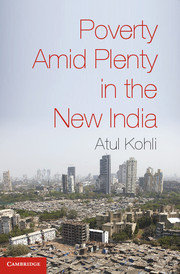Preface and Acknowledgments
Published online by Cambridge University Press: 05 June 2012
Summary
Over the last three decades India's has been among the world's fastest-growing economies. And yet poverty in India has come down only slowly, leaving some 450 million Indians to subsist on less than $1.25 per day; in addition, nearly half of India's children continue to be malnourished. In the pages that follow I analyze both the political origins of this pattern of development, on the one hand, and how the resulting social context of poverty amid plenty is molding Indian politics, on the other. The argument is that, over the last three decades, the Indian state has prioritized economic growth as a goal and established a partnership with Indian business groups in order to achieve this growth. This pro-business ruling alliance has facilitated both rapid economic growth and widening economic inequality. Growing inequality along rural-urban, regional, and class lines has limited the impact of growth on poverty alleviation. A state with its primary focus on growth has also pursued a variety of social programs only half-heartedly. The exclusion of a significant proportion of Indians from the fruits of rapid economic growth is in turn creating a host of new political problems for India's democratic rulers, ranging from how to win the electoral support of the many while facilitating gains for the few, to insurrection by dissatisfied groups, to farmer suicides; the ambitions of India's political class for India to be a global player also suffer. The book suggests that inclusive growth in India is not likely either via pure market-oriented solutions or as a result of an active civil society. Although these will be ingredients of a longer-term inclusive pattern of change, state intervention will remain critical for facilitating inclusive growth in the short to medium term. Given the inadequacies of the Indian state, however, prior political and bureaucratic changes remain necessary for facilitating inclusive growth in the near future.
Books take time to write, preferably uninterrupted time. My first and foremost thanks are thus to Princeton University for its generous leave policy. Much of this book was conceptualized and written over two years of sabbatical leave. I was associated during those two years with the Center for the Advanced Study of India at the University of Pennsylvania. I would like to thank both the founder-director of the center, Francine Frankel, and the current director, Devesh Kapur, for providing congenial intellectual affiliation. I presented materials from this book at two seminars, one at Harvard University and the other at the Jawaharlal Nehru University. The comments of seminar participants helped me rethink some issues. I would like to thank Prerna Singh and Ashutosh Varshney for the opportunity to present at Harvard and to Niraja Gopal Jayal for the same at JNU.
- Type
- Chapter
- Information
- Poverty amid Plenty in the New India , pp. xi - xivPublisher: Cambridge University PressPrint publication year: 2012

